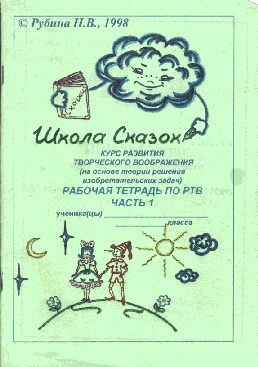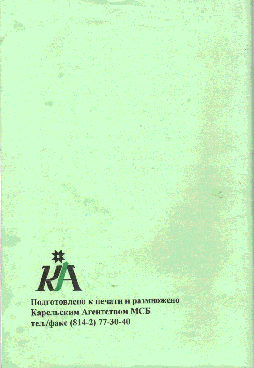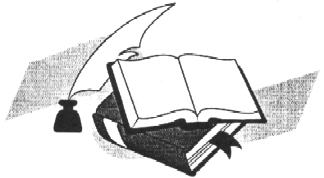Course of Creative Imagination Development (CID), 1st Grade, 1st Semester,
Workbook
English translation by Irina Dolina (Tokyo, Japan) May 23, 2000
Technical Editing by Toru Nakagawa (Osaka Gakuin Univ.) July 11, 2000 and Feb. 28, 2001
List of posting in this Home Page:
| Jan. 30, 2001 | 1st Grade/1st Semester "Fairy Tales School" | Preface, Intro., Topic 1-2 | Guide-Book | Workbook |
| Feb. 28, 2001 | 1st Grade/1st Semester "Fairy Tales School" | Topics 3, 4, 5, 6, 7 (Finished) | Guide-Book | Workbook |
Editor's Note:
Please refer to the Editor's Preface (by T. Nakagawa) and the Author's
Preface (by N. V. Rubina) on the top page of this Course textbook series.
Contents of the CID Course, 1st
Grade, 1st Semester Course
Top Page:
(C) N. V. Rubina, I. Dolina and T. Nakagawa 2001
FAIRY TALES SCHOOL
The Course of Creative Imagination Development
(on the basis of
Theory of Inventive Problem Solving (TRIZ))
STUDENT BOOK ON CID
Part 1.
Student Name: ________________________________________________
Class: ________________________________________
 |
 |

FAIRY TALES SCHOOL
The Course of Creative Imagination Development
(on the basis of
Theory of Inventive Problem Solving (TRIZ))
STUDENT BOOK ON CID
Part 1.
Natalia V. Rubina
Petrozavodsk 1998
English Translation by Irina Dolina, May 23, 2000
Technical Editing by Toru Nakagawa, July 9, 2000 and Feb. 28, 2001
INTRODUCTION
We live in a changing world. Bare knowledge like a frozen copy of the past, can not fully help us to solve the arising problems. An ability to solve creative problems, an advanced imagination are the qualities that mostly define a personality not only of tomorrow but of today, as well.
On the basis of Theory of Inventive Problem Solving (TRIZ) the author of this book has worked out and tested "The Program of the Course of Creative Imagination Development for the elementary school". The controlled imagination allows a person faster and simpler to adapt himself to changing conditions, therefore the course CID is actively used by psychologists for diagnostics and psychological correction of elementary school students.
In order to simplify the work in the framework of this program a student book and a workbook were prepared to be presented here.
The whole program is meant for three grades: "Fairy tales school" - first grade; "The Fantasy City" - second grade; "The Planet of Unsolved Mysteries" - third grade. This program was used to instruct the kids of the first to third grades of School #17 in the course of 4 years. The classes were conducted once a week, the classes were divided into two groups.
The author expresses her deep gratitude to the TRIZ creator G. S. Altshuller, and also to I. N. Murashkovska, A. N. Nesterenko, M. C. Gafitulin, to Sergey and Svetlana Sychovs, N. N. Khomenko, V. I. Timohov, Anatoly and Svetlana Gin, M. S. Rubin, whose work helped a lot in creating the CID course and the workbooks. And of course the help of the first-third grade students of School #17 of Petrozavodsk was very valuable. Thank you, my dear little magicians!
Send your remarks and
proposals at the following address:
185014, Petrozavodsk,
mail box 8, OO "TRIZ- Karelia", to N. V. Rubina.
 |
Hello, dear kids and adults! |
On each page of this exercise-book there is a fairy tale. But in order to read it you have to go an unusual way. The activities and exercises here will help little readers to develop their creative abilities and will the adults, remembering their childhood, to see their children in a new light, to see that their life is full of wonders.
Each of us has our own favorite fairy tales, those that we have heard lots of times from our parents, grandmothers and grandfathers. Often when a fairy tale comes to an end it is a pity to part with its characters and we return to it again and again, devising the continuation of the events. Working with this exercise book may become for you an endless trip to the world of fairy tales. On such a trip you can not do without reliable and inventive companions.
Any fairy tale has characters. In our exercise book there will be also our own characters but they will be devised by the kids themselves.
Composing fairy tales is one of the most interesting activities, proposed by G. S. Altshuller for developing the creative imagination. In order to devise an interesting plot for a fairy tale, it is necessary to place its characters in a predicament. It is important to understand the essence of solving this problem. This is the main aim of this student book. Try to work with this student together and you will receive great pleasure from the intelligent fairy tales, from mutual creative activity, from overcoming your own inertia of the mind.
We tried to compile this exercise book
in such a way that you should have more opportunities to create independently.
You will need scissors, glue, colored pencils and so on. But the
most important is your imagination. This student book is meant for
those who are trying to make their life more interesting and to enrich
it with difficult and happy creative activities. We hope your way
up won't be too difficult but happy and enjoyable for you.

| Home Page | New Information | Introduction to TRIZ | TRIZ References | TRIZ Links |
| TRIZ News & Activities | TRIZ Software Tools | TRIZ Papers and Tech Reports | TRIZ Forum |
Last updated on Feb. 28, 2001. Access point: Editor: nakagawa@utc.osaka-gu.ac.jp